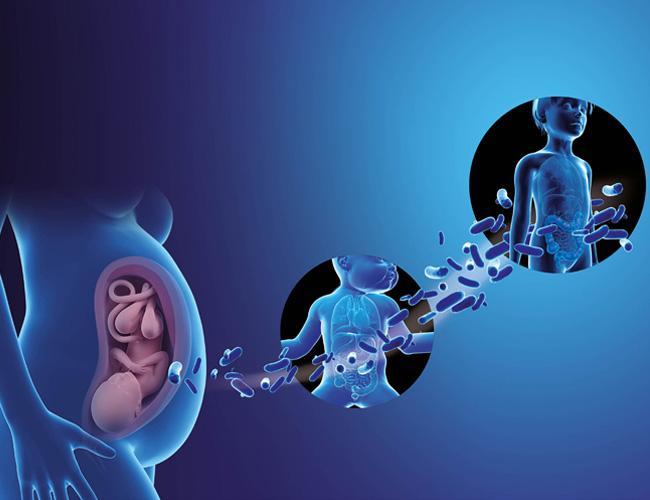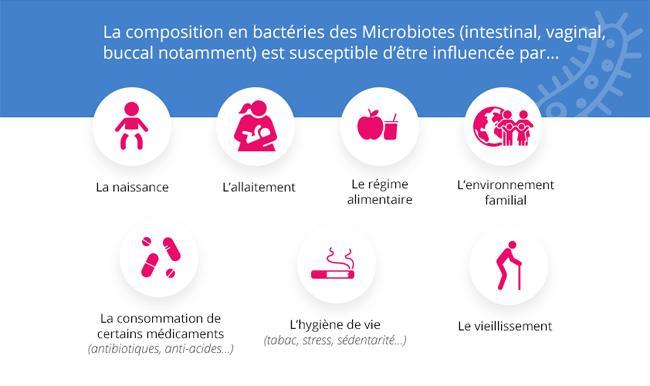A unique microbiota formed from the foetal stage
Each person has a microbiota unique to him/her. It forms over time, influenced by different genetic and environmental factors.
Alongside genetic factors, pregnancy followed by childbirth play a determining role in establishing the first micro-organisms forming the intestinal flora.
During pregnancy, the mother’s intestinal bacteria pass to the future baby via the placenta. Subsequently, the method of childbirth, vaginal delivery (which brings the infant into contact with the mother’s vaginal and intestinal flora) or caesarean section, directly influences the diversity of the infant’s intestinal microbiota.
Subsequently, the composition of the microbiota is largely determined by diet. Starting with the choice of breast or bottle feeding, and continuing to our dietary habits as adults, diet plays a fundamental role throughout our lives in determining the quality and balance of our intestinal microbiota.
Importantly, we know that the majority of the intestinal flora that play a major role in the immune defences (see Current status of research and knowledge) are established essentially during the infant’s time as a foetus and during its first two years of life.

Influenced by numerous factors, some adverse
Apart from diet, other external factors depending on our lifestyles change positively or negatively the diversity and quality of the intestinal flora.
Some of these factors are well known: they may damage the bacterial flora, causing dysbiosis, or an imbalance in the microbiota that is harmful to the body. They include infections, in particular digestive infections (like gastroenteritis), stress, some medications (antibiotics, anti-inflammatories, proton-pump inhibitors (PPI) prescribed for heartburn, etc.), environmental pollutants, “toxins” such as alcohol, tobacco and drugs, etc.
Up to a certain point, our microbiota can resist such attacks and return to its “normal” state after a few weeks or months: this is the concept of microbiota “resilience”.
But if the attacks are repeated, the dysbiosis is likely to persist and affect our health negatively.

Sources :
- Didier Chos (2018) Prenons le pouvoir sur notre santé Vers une médecine sur mesure. Editions Solar.
- Gabriel Perlemuter, Anne-Marie Cassard (2016) Les bactéries, des amies qui vous veulent du bien. Editions Solar.
- Dossier de presse INRA (2017) Microbiote, la révolution intestinale (http://presse.inra.fr/Dossiers-de-presse/Microbiote-la-revolution-intestinale).
- Les fondamentaux de la pathologie digestive/Chapitre 13 Microbiote et immunité intestinale. Elsevier Masson Octobre 2014 (https://www.snfge.org/sites/default/files/SNFGE/Formation/chap-13_fondamentaux-pathologie-digestive_octobre-2014.pdf).
- C Landman, E Quévrain. Le microbiote intestinal : description, rôle et implication physiopathologique. La Revue de médecine interne (2016) 37 : 418-423(http://acces.ens-lyon.fr/acces/thematiques/immunite-et-vaccination/thematiques/virus-et-immunite/utiles-microbiote/pdf/1-s2.0-S0248866315011273-main.pdf).
- Communiqué de presse CNRS (2016) Le microbiote intestinal : un nouvel allié pour une croissance optimale (http://www2.cnrs.fr/presse/communique/4419.htm).
